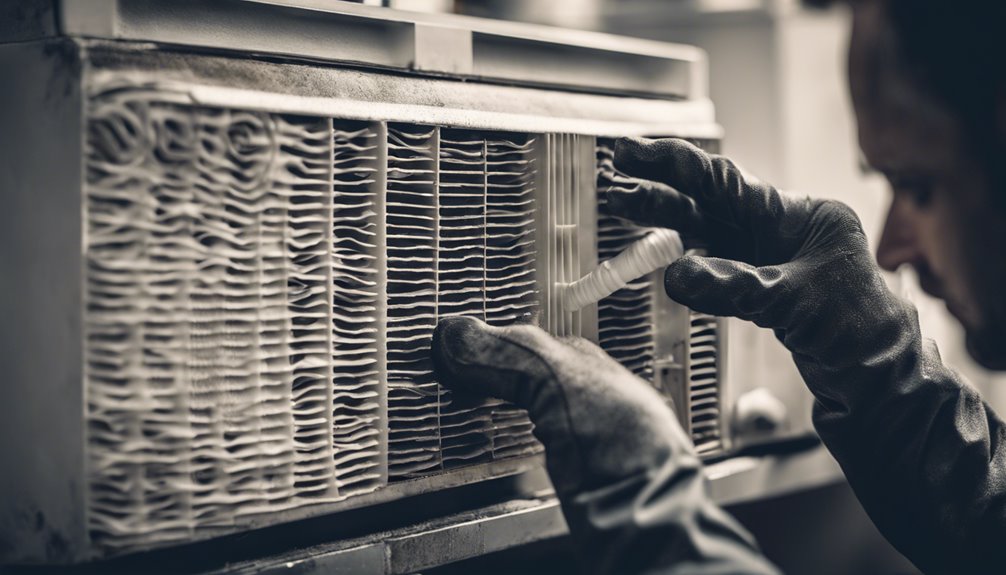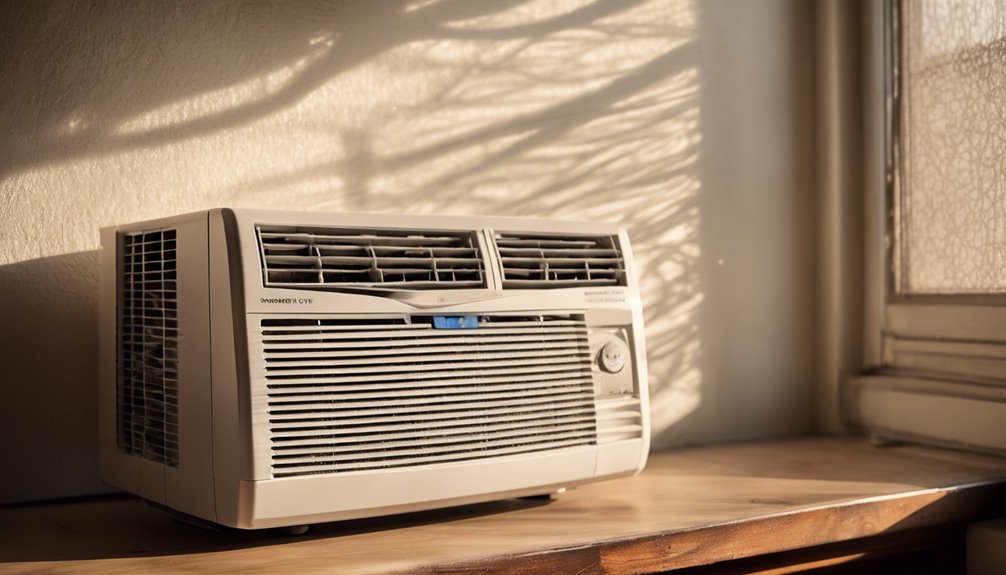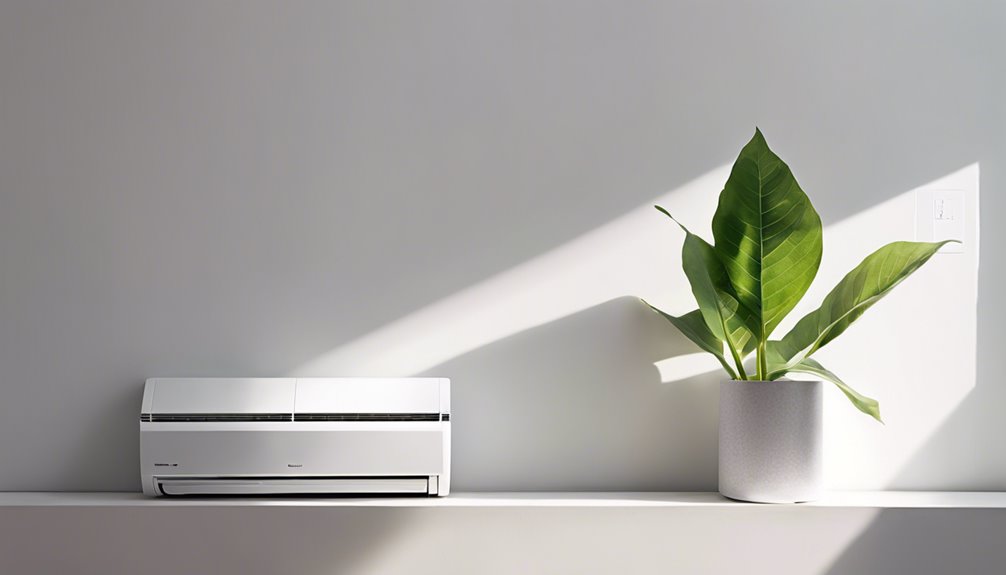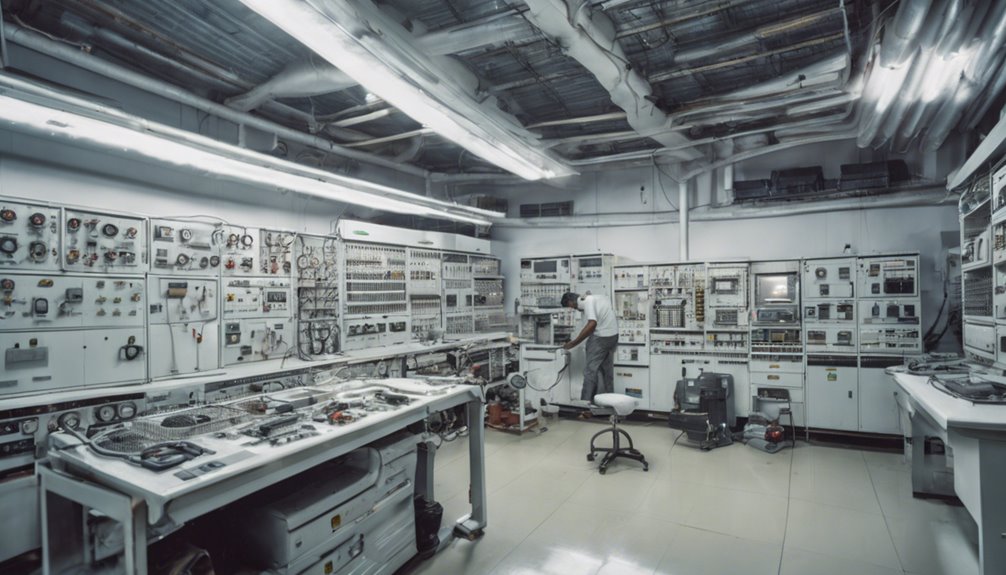By neglecting regular maintenance, you can expect to waste up to 15% of your air conditioner's efficiency every three months, leading to inflated energy bills and premature system failure. To avoid this, prioritize filter cleanings, check for refrigerant leaks, clear debris from the outdoor unit, inspect for water damage, and know when to replace your AC. By following these essential tips, you'll save money on energy costs and repairs. You're one step closer to maximizing your AC's performance and minimizing expenses – learn how to take control of your cooling system.
Key Takeaways
- Clean or replace air conditioner filters every three months to maintain optimal performance and avoid increased energy bills.
- Regular refrigerant checks with a licensed technician can detect potential issues early and save hundreds of dollars in repair costs.
- Keep the outdoor unit clear of debris and obstructions to ensure proper airflow and efficient operation.
- Perform a moisture inspection to detect signs of water damage and address issues before they become costly repairs.
- Replace the air conditioner every 10 years or when frequent breakdowns, high repair costs, and declining performance indicate it's no longer cost-effective.
Prioritize Regular Filter Cleanings for Maximum Efficiency
Every three months, your air conditioner's filter accumulates enough dirt and debris to reduce its efficiency by up to 15%. This means you're paying more for less cooling power.
To avoid this, stick to a regular filter cleaning schedule. Mark your calendar to clean or replace your filter every three months to maintain optimal performance.
Dirty filter consequences can be costly, from increased energy bills to premature system failure. By keeping your filter clean, you'll save money on energy costs and extend the lifespan of your AC unit.
Don't Let Refrigerant Leaks Drain Your Wallet
A refrigerant leak can be a costly nightmare, silently draining your wallet without you even noticing.
If you don't catch it early, you'll be left with a hefty repair bill and a system that's not running efficiently. To avoid this, make sure to schedule regular refrigerant checks with a licensed technician.
They'll perform a leak detection test to identify any potential issues before they become major problems. Catching a refrigerant leak early can save you hundreds of dollars in repair costs and prevent further damage to your system.
Don't wait until it's too late – prioritize refrigerant checks to keep your AC running smoothly and your wallet happy.
Keep Your Outdoor Unit Clear of Debris and Obstructions
Now that you're on top of refrigerant leaks, it's time to focus on another often-overlooked aspect of AC maintenance: the outdoor unit.
The outdoor unit is responsible for dissipating heat, but it can't do its job efficiently if it's surrounded by debris and obstructions.
Make sure to keep the area around your outdoor unit clear of leaves, branches, and other objects that could impede airflow.
- Regularly remove debris from the unit's exterior and surrounding area to ensure proper airflow.
- Keep the unit at least 3 feet away from any obstructions, such as shrubs or fences.
- Trim nearby trees or plants to maintain a clearance of at least 10 feet to prevent leaves and branches from falling onto the unit.
Identify and Address Water Damage Before It's Too Late
How much are you willing to pay to repair water damage to your AC system? The cost can add up quickly, especially if you don't catch the issue early.
To avoid a pricey repair bill, it's essential to identify and address water damage before it's too late. Start by performing a moisture inspection to detect any signs of water spotting or leaks.
Check the condensate drain line, coils, and surrounding areas for water stains or mineral deposits. If you notice any issues, turn off your AC and call a professional to fix the problem.
The sooner you address water damage, the less you'll have to pay in repairs. Don't wait until it's too late – inspect your AC regularly to avoid costly repairs down the line.
Know When to Replace Your AC to Avoid Costly Repairs
Every ten years or so, your air conditioner reaches a critical point where repairs become less cost-effective and replacement becomes the more financially savvy option.
The age factor plays a significant role in determining when it's time to let go of your old AC.
As you weigh the costs of repairs against replacement, consider the following:
- Your energy bills have been increasing steadily, indicating your AC is losing its efficiency.
- You've been experiencing frequent breakdowns, and the repair costs are adding up quickly.
- You've noticed a significant decline in your AC's performance, making your home less comfortable.
Frequently Asked Questions
How Often Should I Inspect My AC for Potential Issues?
You should inspect your AC regularly, ideally every 1-2 months, to catch potential issues before they escalate. Review your cooling schedules and perform filter checks to ensure optimal performance and prevent breakdowns.
What Causes AC Noise and How Can I Fix It?
You're probably wondering why your AC is making so much noise. It's likely due to AC vibrations or air leakages. You can fix it by tightening loose screws, sealing air leaks, and cleaning the condenser coils to reduce vibrations and noise.
Can I DIY AC Repairs or Should I Hire a Pro?
You're wondering if you can tackle AC repairs solo or need a pro's help. If it's a simple issue like a dirty Air Filter or minor adjustment to optimize Cooling Capacity, you might be able to DIY it, but complex problems require professional expertise.
How Do I Know if My AC Is Oversized for My Space?
You're wondering if your AC is oversized for your space. Check the cooling capacity: if it's too high, your system's short cycling, wasting energy, and causing humidity issues. Proper system sizing is key to efficient cooling and cost savings.
Are Smart Thermostats Worth the Investment for AC Efficiency?
You're wondering if smart thermostats are worth the investment for AC efficiency. They definitely are! Smart thermostats optimize cooling benefits, learning your schedule to maximize energy savings – you'll see a significant reduction in your energy bills over time, making it a worthwhile investment.
Conclusion
You've made it through the top 5 essential AC maintenance and repair cost tips. By prioritizing regular filter cleanings, addressing refrigerant leaks, keeping your outdoor unit clear, identifying water damage, and knowing when to replace your AC, you'll be well on your way to saving money and staying cool. Remember, a little maintenance now can save you a lot of hassle and cash in the long run. Stay on top of your AC maintenance to breathe easy and keep your wallet happy.



